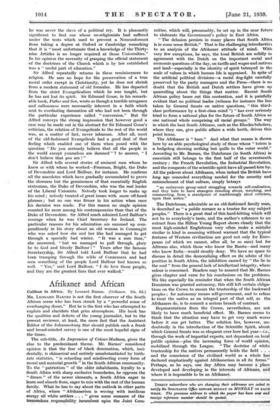Afrikaner and African
Caliban in Africa. By Leonard Barnes. (Gollancz. 10s. (id) Ma. LEONARD BARNES is not the first observer of the South African scene who has been struck by a " powerful sense of overhanging doom." But he is the first who has attempted to explain and elucidate that grim atmosphere. His book has the qualities and defects of the young journalist, but to the present reviewer, at least, the -mere fact that the Assistant Editor of the Johannesburg Star should publish such a frank and broad-minded survey is one of the most hopeful signs of the times.
The sub-title, An Impression of Colour-Madness, gives the clue to the predominant theme. Mr. Barnes' considered opinion is that the fear of black domination, which, inciz dentally, is chimerical and entirely unsubstantiated by birth= rate statistics, " is retarding and misdirecting every form of moral and material growth " in the South African community. To the " patriotism " of the older inhabitants, loyalty to a South Africa with sharp exclusive boundaries, he opposes the " dream " of the newer elements, a South Africa eager to learn and absorb from, eager to mix with the rest of the human family. What he has to say about the outlook in other parts of Africa, where " Afrikanexism is wooing with insidious energy all white settlers . . . " gives some measure of the tremendous_responsibility_ incumbent upon the Joint Conk
mittee, which will, presumably, be set up in the near future to elaborate the Government's policy in East Africa.
" The delusion persists in many places that South Africa is in some sense British." That is the challenging introdUctiOn to an analysis of the Afrikaner attitude of mind. -With very few exceptions, he says, the local British are solidly in agreement with the Dutch on the important social and economic questions of the day, 'on tariffs and wages and natives and land—especially is the identity of spirit betrayed in -the scale of values in which human life is appraised. In spite• of the artificial political divisions—a racial dog-fight carefully
preserved by the party managers and the Press—there is no doubt that the British and Dutch settlers have given,up
quarrelling about - the things that matter. . Recent South African policy bears out this contention, and it is painfully evident that no political leader (witness for instance the line taken by General Smuts on native questions, " this third- class performance by a first-class mind ") " has ever seriously tried to form a rational plan for the future of South Africa as one national whole comprising all racial groups." The way in which the best South Africans, such as the Rhodes Scholars, where they can, give public affairs a wide berth, drives this point home.
The Afrikaner is " bass." And what that means is shown here by an able psychological study of those whose " totem is a hedgehog showing nothing but quills to the outer world."
. According to Mr. Barnes, the Dutchman (in South Africa) in essentials still belongs to the first half of -the seventeenth century ; the French Revolution, the Industrial Revolution, and the conquests of the scientific spirit have all passed him by. All the palaver about Afrikaans, when indeed the British have long ago conceded everything needed for: the security and entrenchment of that culture, simply betrays
" an embryonic group-mind struggling. towards self-realization, and they hate to have strangers standing about, watching, and Commenting, from a standpoint of maddeningly aloof criticism, upon their antics."
The Dutchman, admirable as an old-fashioned fainily man, is described as " a public menace as a trustee for, any subject peoples." There is a great deal of this, hard-hitting which will not be to everybody's taste, and the author's reference to an extract from the Hilton Young Report shows clearly that the most high-minded Englishmen very often make ,a mistake similar in kind in assuming without warrant that the typical features of Western civilization are good not only for Euro- peans (of which we cannot, after all, be so sure) but for Africans also, which those who know the Bantu—and many who know India—would stoutly deny. We have no space to
discuss in detail the demoralizing effect on the whites of the position in South Africa, the inhibition caused by`" the lie in the soul " from-the general of intellectual integrity, where
colour is concerned. Readers may be assured that Mr. Barnes gives chapter and verse for his conclusions on the problems. We like especially his reminder. that when the South African Dominion was granted autonomy, this still left certain obliga- tions on the Crown to ensure the trusteeship of the backward
peoples ; for autonomy means self-government, and to refuse to treat the native as an integral part of that self, as the
Afrikaners do, is to commit a serious breach of contract. Representations from the Crown, nevertheless, are not likely to have much beneficial effect. Mr. Barnes seems to think that the situation may have to get very much worse
before it can get better. The solution lies, however, un- doubtedly in the introduction of the Scientific Spirit,, about
which General Smuts was so eloquent over here last
through the work of impartial experts, not dependent on local pUblic opinion—plus the increasing force of world opinion,:. mobilized through the League. " The doctrine of white trusteeship for the natives permanently hOlds the field . .Y . and the conscience of the civilized world as a. whole has declared emphatically against Afrikarierism in all its forms." Perhaps, as he says, one _day Africa may become a 'place developed and developing in the interests of Africans, and where it is impossible to be an Afrikaner.








































 Previous page
Previous page